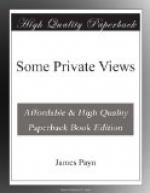I once beheld a young lady of great literary taste, and of exquisite sensibility, torn to pieces (figuratively) and trampled upon by a great scholar for venturing to make a comparison between those two poems. Its invocation to the Muses, and the general classical air which pervades it, had destroyed for her the pathos of ‘Lycidas,’ whereas to her antagonist those very imperfections appeared to enhance its beauty. I did not interfere, because the wretch was her husband, and it would have been worse for her if I had, but my sympathies were entirely with her. Her sad fate—for the massacre took place in public—would, I was well aware, have the effect of making people lie worse than ever about Milton. On that same evening, while some folks were talking about Mr. Morris’s ‘Earthly Paradise,’ I heard a scornful voice exclaim, ’Oh! give ME “Paradise Lost,"’ and with that gentleman I did have it out. I promptly subjected him to cross-examination, and drove him to that extremity that he was compelled to admit he had never read a word of Milton for forty years, and even then only in extracts from ’Enfield’s Speaker.’
With Shakespeare—though there is a good deal of lying about him—the case is different, and especially with elderly people; for ’in their day,’ as they pathetically term it, Shakespeare was played everywhere, and everyone went to the play. They do not read him, but they recollect him; they are well acquainted with his beauties—that is, with the better known of them—and can quote him with manifest appreciation. They are, intellectually, in a position much superior to that of a fashionable lady of my acquaintance who informed me that her daughters were going to the theatre that night to see Shakespeare’s ’Turning of the Screw.’
The writer who has done most, without I suppose intending it, to promote hypocrisy in literature is Macaulay. His ‘every schoolboy knows’ has frightened thousands into pretending to know authors with whom they have not even a bowing acquaintance. It is amazing that a man who had read so much should have written so contemptuously of those who have read but little; one would have thought that the consciousness of superiority would have forbidden such insolence, or that his reading would have been extensive enough to teach him at least how little he had read of what there was to read; since he read some things—works of imagination and humour, for example—to such very little purpose, he might really have bragged a little less. One feels quite grateful to Macaulay, however, for avowing his belief that he was the only man who had read through the ‘Faery Queen;’ since that exonerates everybody—I do not say from reading it, because the supposition is preposterous—but from the necessity of pretending to have read it. The pleasure derived from that poem to most minds is, I am convinced, analogous to that already spoken of as being imparted by a foreign author: namely, the satisfaction at finding it—in places—intelligible.




